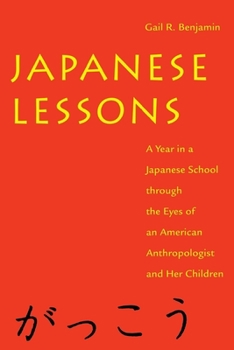Japanese Lessons: A Year in a Japanese School Through the Eyes of an American Anthropologist and Her Children
Select Format
Select Condition 
Book Overview
Benjamin dismantles Americans' preconceived notions of the Japanese education system
Format:Paperback
Language:English
ISBN:0814713343
ISBN13:9780814713341
Release Date:August 1998
Publisher:New York University Press
Length:272 Pages
Weight:0.65 lbs.
Dimensions:0.7" x 5.5" x 8.2"
Customer Reviews
5 ratings
An accurate and engaging account
Published by Thriftbooks.com User , 16 years ago
Anyone with an interest in Japanese schools will enjoy this book, since it describes in detail the workings of a single school. Teachers (those going to Japan on the Fulbright Memorial program, for instance) will find it particularly useful. Benjamin, whose two children attended an elementary school during the year their parents spent at a Japanese university, draws on her own training as an anthropologist to offer a view of Japanese education based on the experiences of her children, one in first grade and one in fifth. She admires many aspects of the Japanese system and is critical of others, all the while offering an implicit contrast to American practices. At the end, she offers suggestions as to how American education could be improved using Japanese models. Especially interesting are her observations about group work, moral education, and, in particular, the value of large classes! I read the book before visiting a Japanese elementary school and can vouch for the accuracy of Benjamin's observations.
Accurate and Detailed
Published by Thriftbooks.com User , 20 years ago
I teach English at two Japanese Elementary schools an hour's drive from the elementary school described in this book. I also have an American daughter in a Japanese pre-school who is headed for elementary school soon. I found this book rich in useful, practical details and perceptive analysis. In fact, as one who has studied American education I found that Gail Benjamin's weaker points arose when she described American elementary education to contrast with the Japanese elementary school. I also believe readers should be aware that many changes occur after Japanese primary education (grades 1 E6) in the following junior high school, high school, and tertiary education. I believe the most negative aspects of a Japanese education occur AFTER the primary education. In Japanese elementary school children are relatively free spirits in the classroom compared with what follows. This uninhibited spirit is coupled with academic rigor. Gail Benjamin's book accurately and richly portrays much of Japanese elementary school experience.
See the forest for the trees.
Published by Thriftbooks.com User , 20 years ago
Many books on Japan and China will try to give you everything from a history lesson to a break-down of their culture and ideals. Whole chapters are needed by the author just to define the terms he, or she, will be using. This book is nothing like that. She does not TELL us about Japanese school systems, she SHOWS us how a Japanese school works, through her eyes and the eyes of her two kids. She explains about uniforms, Sports Day, lunches, how classes are set up, how many hours a student goes to school in a year, how a class is run and so on.The book is an easy read, full of details that other books just seem to over-look. Remember, that this is dealing with one elementary school, and does not reflect how things are done in the Senior High Schools and/or Colleges, but it does destroy a few myths I had about how the Japanese taught their children and the book was also a delight to read!Try to get a copy, any condition. It's worth it!
Enjoyable analysis; something hard to come by
Published by Thriftbooks.com User , 23 years ago
I had Gail Benjamin as a lecturer in a Japanese society course at the University of Pittsburgh in late 1999. Not only was the class fascinating, but "Japanese Lessons" (compulsory reading for the class) sparked within me new interest in the subject. I highly recommend it for anyone interested in japanese society, and stress that it is not in the least bit textbook-like.
Read this and increase your understanding about the Japanese
Published by Thriftbooks.com User , 26 years ago
The people of many countries are stereotyped and this is certainly true of the Japanese. Gail Benjamin's observations about her children's experiences in Japanese schools and her own participation in the process provide valuable insight into the entire behavior of the Japanese. I lived and worked in Japan for three years (with a Japanese staff for part of the time.)I would have benefitted from a better understanding of the school system. Everything I had heard was no better than second hand information from expats or Western writers with no direct experience. The overall stereotype is that Japanese teachers lecture and the students listen. The teachers are not questioned. While questioning the teachers may or may not occur the overall group emphasis and its nuances are an integral part of the Japanese society throughout life. The many variations of group activities described here (and the expected support of the parents) are not known by many Americans. I'd put this book in my Top 5 of those to read if you want to understand more about the Japanese.





